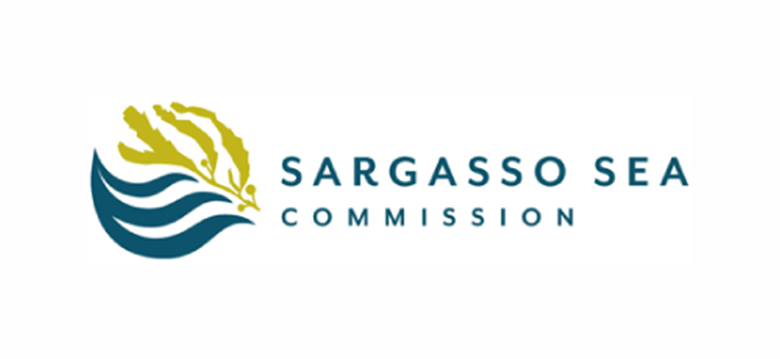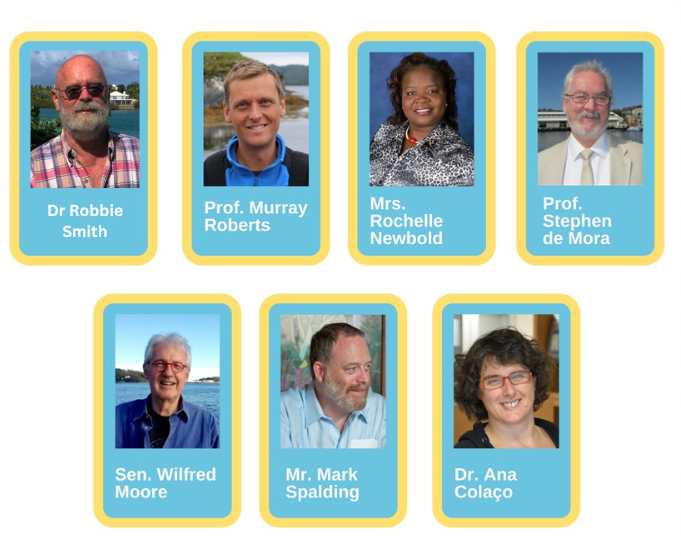
The Sargasso Sea Commission is celebrating the 10th Anniversary of the Hamilton Declaration on Collaboration for the Conservation of the Sargasso Sea with a series of technical meetings in Bermuda.
The Sargasso Sea Commission in partnership with the Government of Bermuda produced the following video to commemorate the occasion: https://youtu.be/E7O5vN_ngEU.
The Hon. Minister Walter Roban, JP, MP, Deputy Premier and Minister of Home Affairs also recorded a video statement for the meetings: https://youtu.be/abn_cS5oIws.
Representatives of the Governments that have signed the Hamilton Declaration and the Sargasso Sea Commissioners gathered at Cambridge Beaches, Bermuda earlier this week – ten years after the initial signing, to celebrate this momentous occasion.
The Commissioners and the Government Representatives attended a two-day series of meetings to coordinate the implementation of two projects of the Sargasso Sea Commission which will update the science case for the Sargasso Sea ecosystem and create a stakeholder-endorsed plan for its conservation.
“The Sargasso Sea is vitally important for Bermuda and globally recognized for the ecosystem services it provides. It is a developmental habitat for many species of pelagic fish and sea turtles, and a migratory corridor for whales, dolphins, sharks and rays. It also upholds climate resilience by acting as a significant carbon sink,” said the Hon. Walter Roban, JP, MP, Deputy Premier and Minister of Home Affairs. “The Government of Bermuda is honoured to be a part of this global effort to conserve our precious oceans.”
The Hamilton Declaration is a non-binding political statement. It focuses on voluntary collaboration for the conservation of the Sargasso Sea between governments, scientists, intergovernmental organizations, and other bodies. The establishment and the work of the Commission have been described as “a new paradigm for high seas ocean conservation.”
Bermuda is the only land mass in the Sargasso Sea and the Government of Bermuda has served as a champion for its conservation. After more than two years of negotiations, the Hamilton Declaration was signed on March 11th, 2014 at a meeting hosted by the Government of Bermuda. Bermuda was one of the original five signatories along with the Azores, Monaco, the UK, and the US. They were later joined by the British Virgin Islands, the Bahamas, Canada, the Cayman Islands, and the Dominican Republic.
The Hamilton Declaration also envisaged a Commission of scientific experts that would act as “a steward” of this extraordinary part of the ocean and to “keep its health, productivity and resilience under continual review.”

The current Sargasso Sea Commissioners are Dr Robbie Smith, Curator of the Natural History Museum, Bermuda Aquarium, Museum & Zoo, Bermuda; Dr Ana Colaço, Deep-sea ecologist, University of Azores, Professor Stephen de Mora, former Chief Executive of the Plymouth Marine Laboratory ; Senator Wilfred Moore, (retired) Canada; Mrs. Rochelle Newbold, Special Advisor Climate Change & Environmental Matters, Office of the Prime Minister of The Bahamas; Professor Murray Roberts, Professor of Applied Marine Biology & Ecology at the University of Edinburgh; Mr Mark J Spalding, President of The Ocean Foundation.
Difficult to study and protect, providing countless ecosystem services, but not owned by any one country, the high seas have been described as a “tragedy of the commons.” It is governed by regional and sectoral organisations, making it challenging to govern comprehensively, and leaving many governance gaps. The Sargasso Sea Commission offers a structure to achieve voluntary collaboration for conservation in the region.
The work of the Sargasso Sea Commission informs and reacts to the development of the new United Nations BBNJ Agreement – a treaty on Biodiversity in Areas Beyond National Jurisdiction. The BBNJ Agreement text was finalised on March 4, 2023. This monumental agreement would allow internationally legally binding marine protected areas to be established on the high seas for the first time.
The treaty has been signed by 88 countries, but so far only Palau and Chille have ratified it. The treaty requires 60 ratifications to enter into force.
“I am delighted to return to Bermuda to celebrate a decade of achievements for the Sargasso Sea Commission,” said Dr. David Freestone, Executive Secretary of the Sargasso Sea Commission. “With the leadership of the Government of Bermuda, we have come a long way since 2014. We are now widely regarded as a flagship initiative for the implementation of the new BBNJ agreement.”
In the decade since its inception, the Sargasso Sea Commission has successfully advocated for the description of the Sargasso Sea by the Convention on Biological Diversity as an Ecologically or Biologically Significant Area, facilitated collaboration with the range states of the European and American anguillid eel, which only spawn in the Sargasso Sea, and brought about the closure of seamounts in the Sargasso Sea to bottom trawling through the Northwest Atlantic Fisheries Organization in 2016.
With major grants from the Global Environment Facility and the French Facility for Global Environment, the Sargasso Sea Commission aims to develop a comprehensive assessment of this iconic ecosystem, and create a strategic action programme for its conservation, with the support and endorsement of stakeholders.
More about Sargasso Sea Commission Projects
The Global Environment Facility funded Common Oceans Sargasso Sea project is committed to facilitating a collaborative, cross-sectoral and sustainable stewardship mechanism to put in place a comprehensive conservation framework to protect the unique ecosystem of the Sargasso Sea. Led by UNDP, implemented by IOC UNESCO, and supported by a comprehensive network of partners, it brings together the regional fisheries management organizations, national agencies and intergovernmental organizations and initiatives, the private sector, civil society and academia.
Funded by the French Facility for Global Environment, and supported by the University of Western Brittany, Mar Viva, and the Sargasso Sea Commission, The ‘SARGADOM’ project focuses on two remarkable high seas sites – the Sargasso Sea in the North Atlantic (‘SARGA’) and the Thermal Dome in the Eastern Tropical Pacific (‘DOM’). The aim of the project is to contribute to the protection of biodiversity and ecosystem services, and to facilitate the development of hybrid ocean governance approaches for the two sites.
More about the Sargasso Sea
The Sargasso Sea is a two-million square mile open ocean ecosystem, bounded by the circulating currents of the North Atlantic Gyre. The foundation of this incredible pelagic ecosystem is the floating, golden Sargassum seaweed for which the sea is named. As well as supporting ten fascinating endemic species, Sargassum acts as critical nursery habitat for many species of pelagic fish and several species of sea turtle. The Sargasso Sea is the only known spawning area for two species of endangered anguillid eel – which transition from marine breeding grounds to freshwater feeding grounds. It also acts as a migratory corridor for several species of sharks, rays, and cetaceans. It is also a significant carbon sink due to the sinking of Sargassum to the deep sea, representing ca. 7% of the global net biological carbon pump. The Sargasso Sea is threatened by various pressures – including impacts from shipping, fishing, plastic and other pollutants, and climate change.
Contact:
Dr David Freestone
Executive Secretary, Sargasso Sea Commission
Tel. (202)-518-2071
dfreestone@sargassoseacommission.org
Fae Sapsford
Marine Research Fellow, Sargasso Sea Commission
Tel. 1(441) 799 5976
fsapsford@sargassoseacommission.org
